Reflective Journal: COMR2010 - Cultural Diversity: Part C - Module 5
VerifiedAdded on 2022/08/11
|6
|1355
|18
Journal and Reflective Writing
AI Summary
This reflective journal entry, part of the COMR2010 Cultural Diversity course, explores the student's learning journey through Module 5, focusing on strategies for living together in a diverse world. The student reflects on intercultural communication, empathy, and the challenges of cross-cultural interactions. The journal discusses the student's initial reactions to the learning materials, the most interesting aspects of the module (such as the connection between the Golden Rule and intercultural behavior), and how new knowledge enhances existing understanding. The entry also identifies areas for further development, including mindful dimensions, analytical empathy, and problem-solving skills. The student analyzes the contribution of the learning to personal, social, and professional development, and how this learning will influence future behavior and practices. The journal concludes with an emphasis on the importance of cultural competence for future leaders and managers, as well as in personal and professional lives, highlighting the necessity of collaborative dialogue and listening.
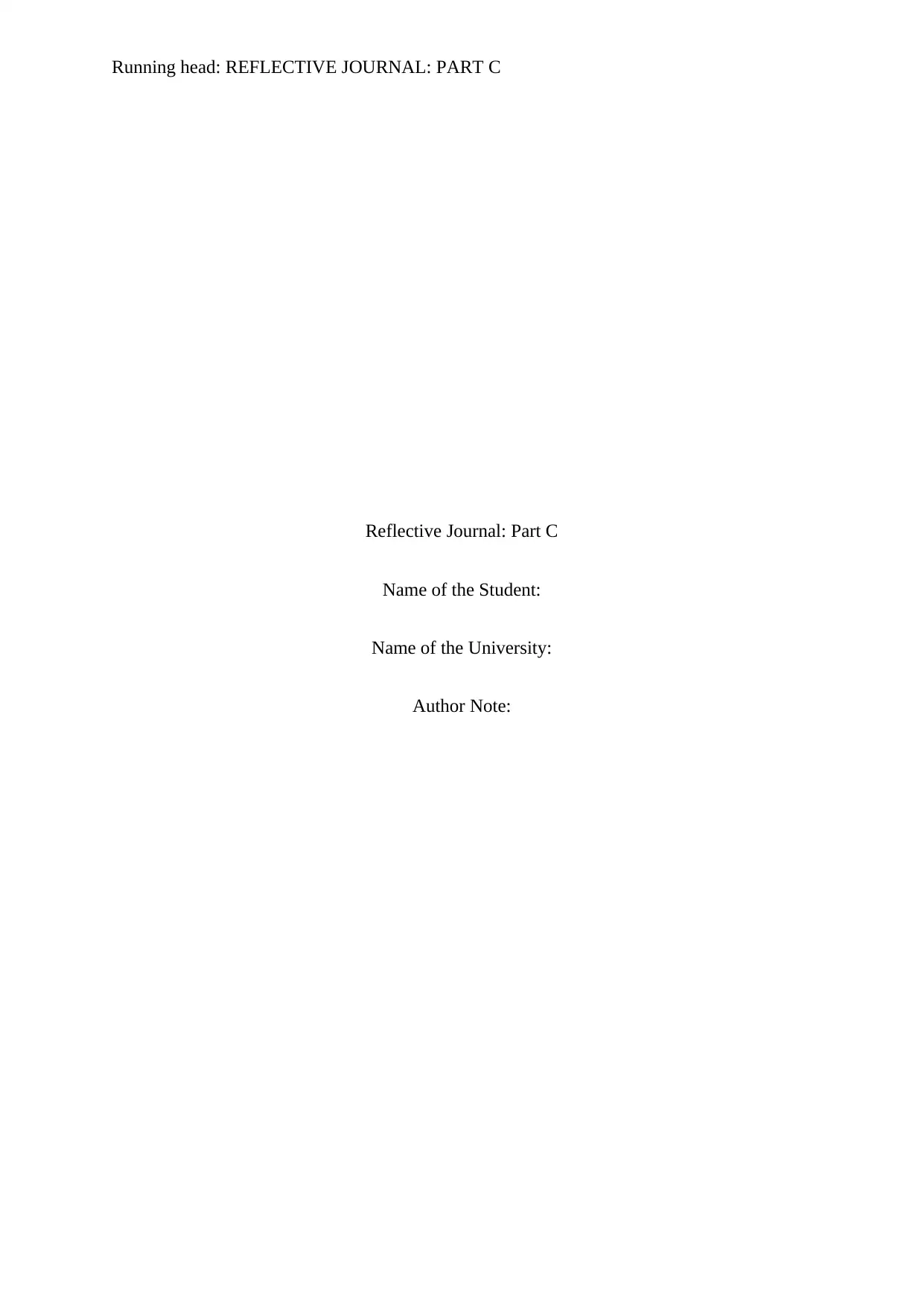
Running head: REFLECTIVE JOURNAL: PART C
Reflective Journal: Part C
Name of the Student:
Name of the University:
Author Note:
Reflective Journal: Part C
Name of the Student:
Name of the University:
Author Note:
Paraphrase This Document
Need a fresh take? Get an instant paraphrase of this document with our AI Paraphraser
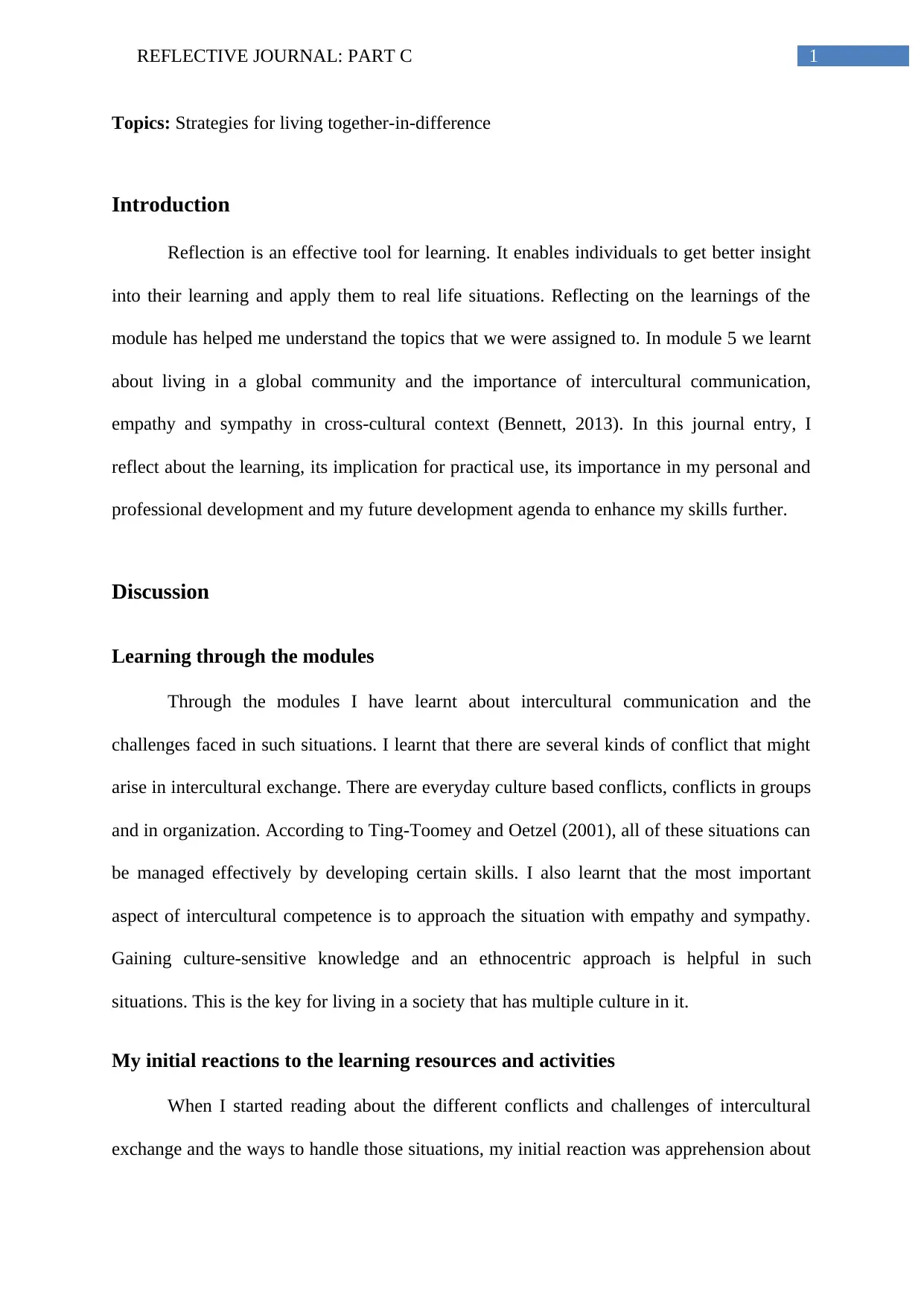
1REFLECTIVE JOURNAL: PART C
Topics: Strategies for living together-in-difference
Introduction
Reflection is an effective tool for learning. It enables individuals to get better insight
into their learning and apply them to real life situations. Reflecting on the learnings of the
module has helped me understand the topics that we were assigned to. In module 5 we learnt
about living in a global community and the importance of intercultural communication,
empathy and sympathy in cross-cultural context (Bennett, 2013). In this journal entry, I
reflect about the learning, its implication for practical use, its importance in my personal and
professional development and my future development agenda to enhance my skills further.
Discussion
Learning through the modules
Through the modules I have learnt about intercultural communication and the
challenges faced in such situations. I learnt that there are several kinds of conflict that might
arise in intercultural exchange. There are everyday culture based conflicts, conflicts in groups
and in organization. According to Ting-Toomey and Oetzel (2001), all of these situations can
be managed effectively by developing certain skills. I also learnt that the most important
aspect of intercultural competence is to approach the situation with empathy and sympathy.
Gaining culture-sensitive knowledge and an ethnocentric approach is helpful in such
situations. This is the key for living in a society that has multiple culture in it.
My initial reactions to the learning resources and activities
When I started reading about the different conflicts and challenges of intercultural
exchange and the ways to handle those situations, my initial reaction was apprehension about
Topics: Strategies for living together-in-difference
Introduction
Reflection is an effective tool for learning. It enables individuals to get better insight
into their learning and apply them to real life situations. Reflecting on the learnings of the
module has helped me understand the topics that we were assigned to. In module 5 we learnt
about living in a global community and the importance of intercultural communication,
empathy and sympathy in cross-cultural context (Bennett, 2013). In this journal entry, I
reflect about the learning, its implication for practical use, its importance in my personal and
professional development and my future development agenda to enhance my skills further.
Discussion
Learning through the modules
Through the modules I have learnt about intercultural communication and the
challenges faced in such situations. I learnt that there are several kinds of conflict that might
arise in intercultural exchange. There are everyday culture based conflicts, conflicts in groups
and in organization. According to Ting-Toomey and Oetzel (2001), all of these situations can
be managed effectively by developing certain skills. I also learnt that the most important
aspect of intercultural competence is to approach the situation with empathy and sympathy.
Gaining culture-sensitive knowledge and an ethnocentric approach is helpful in such
situations. This is the key for living in a society that has multiple culture in it.
My initial reactions to the learning resources and activities
When I started reading about the different conflicts and challenges of intercultural
exchange and the ways to handle those situations, my initial reaction was apprehension about
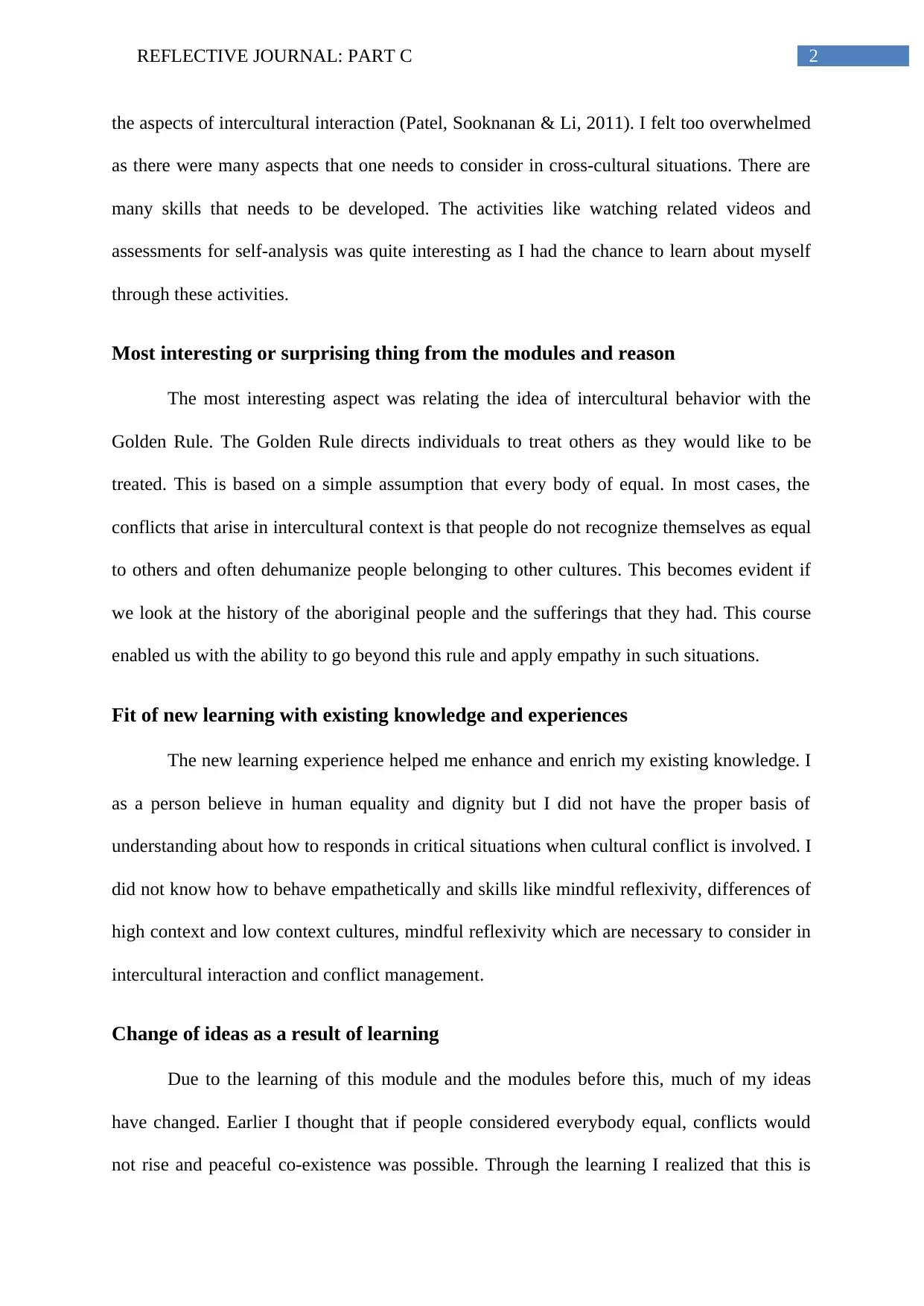
2REFLECTIVE JOURNAL: PART C
the aspects of intercultural interaction (Patel, Sooknanan & Li, 2011). I felt too overwhelmed
as there were many aspects that one needs to consider in cross-cultural situations. There are
many skills that needs to be developed. The activities like watching related videos and
assessments for self-analysis was quite interesting as I had the chance to learn about myself
through these activities.
Most interesting or surprising thing from the modules and reason
The most interesting aspect was relating the idea of intercultural behavior with the
Golden Rule. The Golden Rule directs individuals to treat others as they would like to be
treated. This is based on a simple assumption that every body of equal. In most cases, the
conflicts that arise in intercultural context is that people do not recognize themselves as equal
to others and often dehumanize people belonging to other cultures. This becomes evident if
we look at the history of the aboriginal people and the sufferings that they had. This course
enabled us with the ability to go beyond this rule and apply empathy in such situations.
Fit of new learning with existing knowledge and experiences
The new learning experience helped me enhance and enrich my existing knowledge. I
as a person believe in human equality and dignity but I did not have the proper basis of
understanding about how to responds in critical situations when cultural conflict is involved. I
did not know how to behave empathetically and skills like mindful reflexivity, differences of
high context and low context cultures, mindful reflexivity which are necessary to consider in
intercultural interaction and conflict management.
Change of ideas as a result of learning
Due to the learning of this module and the modules before this, much of my ideas
have changed. Earlier I thought that if people considered everybody equal, conflicts would
not rise and peaceful co-existence was possible. Through the learning I realized that this is
the aspects of intercultural interaction (Patel, Sooknanan & Li, 2011). I felt too overwhelmed
as there were many aspects that one needs to consider in cross-cultural situations. There are
many skills that needs to be developed. The activities like watching related videos and
assessments for self-analysis was quite interesting as I had the chance to learn about myself
through these activities.
Most interesting or surprising thing from the modules and reason
The most interesting aspect was relating the idea of intercultural behavior with the
Golden Rule. The Golden Rule directs individuals to treat others as they would like to be
treated. This is based on a simple assumption that every body of equal. In most cases, the
conflicts that arise in intercultural context is that people do not recognize themselves as equal
to others and often dehumanize people belonging to other cultures. This becomes evident if
we look at the history of the aboriginal people and the sufferings that they had. This course
enabled us with the ability to go beyond this rule and apply empathy in such situations.
Fit of new learning with existing knowledge and experiences
The new learning experience helped me enhance and enrich my existing knowledge. I
as a person believe in human equality and dignity but I did not have the proper basis of
understanding about how to responds in critical situations when cultural conflict is involved. I
did not know how to behave empathetically and skills like mindful reflexivity, differences of
high context and low context cultures, mindful reflexivity which are necessary to consider in
intercultural interaction and conflict management.
Change of ideas as a result of learning
Due to the learning of this module and the modules before this, much of my ideas
have changed. Earlier I thought that if people considered everybody equal, conflicts would
not rise and peaceful co-existence was possible. Through the learning I realized that this is
⊘ This is a preview!⊘
Do you want full access?
Subscribe today to unlock all pages.

Trusted by 1+ million students worldwide
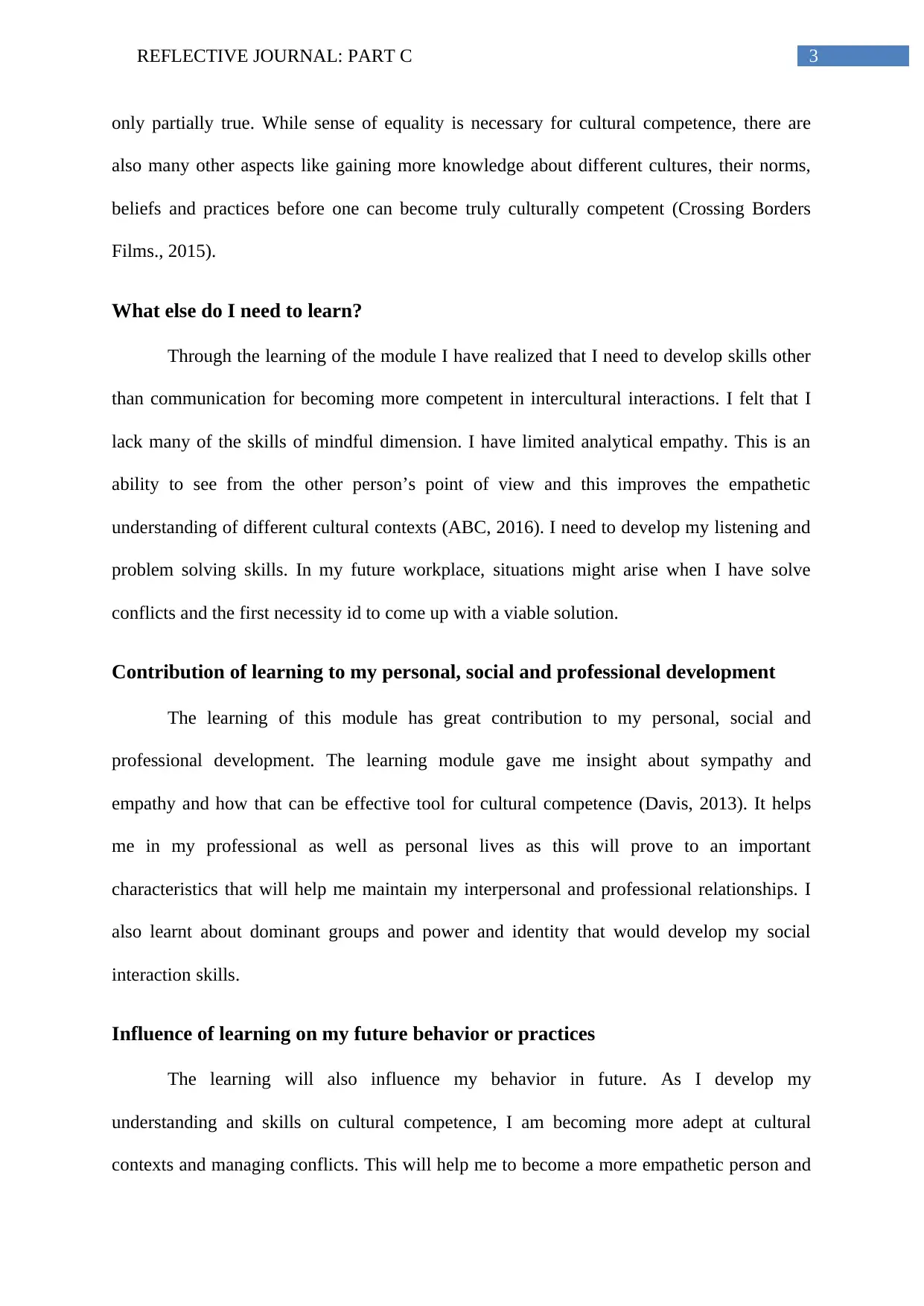
3REFLECTIVE JOURNAL: PART C
only partially true. While sense of equality is necessary for cultural competence, there are
also many other aspects like gaining more knowledge about different cultures, their norms,
beliefs and practices before one can become truly culturally competent (Crossing Borders
Films., 2015).
What else do I need to learn?
Through the learning of the module I have realized that I need to develop skills other
than communication for becoming more competent in intercultural interactions. I felt that I
lack many of the skills of mindful dimension. I have limited analytical empathy. This is an
ability to see from the other person’s point of view and this improves the empathetic
understanding of different cultural contexts (ABC, 2016). I need to develop my listening and
problem solving skills. In my future workplace, situations might arise when I have solve
conflicts and the first necessity id to come up with a viable solution.
Contribution of learning to my personal, social and professional development
The learning of this module has great contribution to my personal, social and
professional development. The learning module gave me insight about sympathy and
empathy and how that can be effective tool for cultural competence (Davis, 2013). It helps
me in my professional as well as personal lives as this will prove to an important
characteristics that will help me maintain my interpersonal and professional relationships. I
also learnt about dominant groups and power and identity that would develop my social
interaction skills.
Influence of learning on my future behavior or practices
The learning will also influence my behavior in future. As I develop my
understanding and skills on cultural competence, I am becoming more adept at cultural
contexts and managing conflicts. This will help me to become a more empathetic person and
only partially true. While sense of equality is necessary for cultural competence, there are
also many other aspects like gaining more knowledge about different cultures, their norms,
beliefs and practices before one can become truly culturally competent (Crossing Borders
Films., 2015).
What else do I need to learn?
Through the learning of the module I have realized that I need to develop skills other
than communication for becoming more competent in intercultural interactions. I felt that I
lack many of the skills of mindful dimension. I have limited analytical empathy. This is an
ability to see from the other person’s point of view and this improves the empathetic
understanding of different cultural contexts (ABC, 2016). I need to develop my listening and
problem solving skills. In my future workplace, situations might arise when I have solve
conflicts and the first necessity id to come up with a viable solution.
Contribution of learning to my personal, social and professional development
The learning of this module has great contribution to my personal, social and
professional development. The learning module gave me insight about sympathy and
empathy and how that can be effective tool for cultural competence (Davis, 2013). It helps
me in my professional as well as personal lives as this will prove to an important
characteristics that will help me maintain my interpersonal and professional relationships. I
also learnt about dominant groups and power and identity that would develop my social
interaction skills.
Influence of learning on my future behavior or practices
The learning will also influence my behavior in future. As I develop my
understanding and skills on cultural competence, I am becoming more adept at cultural
contexts and managing conflicts. This will help me to become a more empathetic person and
Paraphrase This Document
Need a fresh take? Get an instant paraphrase of this document with our AI Paraphraser
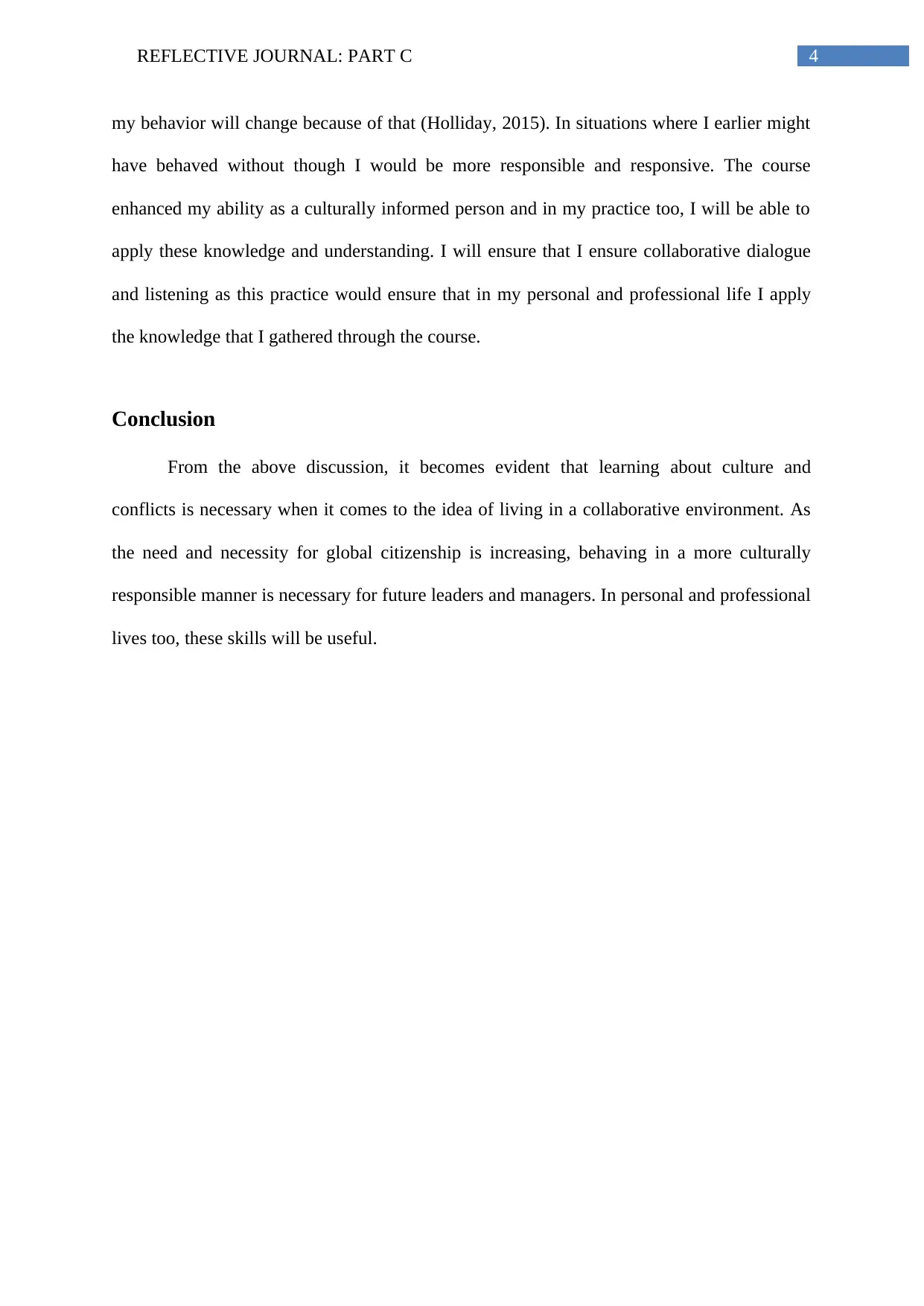
4REFLECTIVE JOURNAL: PART C
my behavior will change because of that (Holliday, 2015). In situations where I earlier might
have behaved without though I would be more responsible and responsive. The course
enhanced my ability as a culturally informed person and in my practice too, I will be able to
apply these knowledge and understanding. I will ensure that I ensure collaborative dialogue
and listening as this practice would ensure that in my personal and professional life I apply
the knowledge that I gathered through the course.
Conclusion
From the above discussion, it becomes evident that learning about culture and
conflicts is necessary when it comes to the idea of living in a collaborative environment. As
the need and necessity for global citizenship is increasing, behaving in a more culturally
responsible manner is necessary for future leaders and managers. In personal and professional
lives too, these skills will be useful.
my behavior will change because of that (Holliday, 2015). In situations where I earlier might
have behaved without though I would be more responsible and responsive. The course
enhanced my ability as a culturally informed person and in my practice too, I will be able to
apply these knowledge and understanding. I will ensure that I ensure collaborative dialogue
and listening as this practice would ensure that in my personal and professional life I apply
the knowledge that I gathered through the course.
Conclusion
From the above discussion, it becomes evident that learning about culture and
conflicts is necessary when it comes to the idea of living in a collaborative environment. As
the need and necessity for global citizenship is increasing, behaving in a more culturally
responsible manner is necessary for future leaders and managers. In personal and professional
lives too, these skills will be useful.
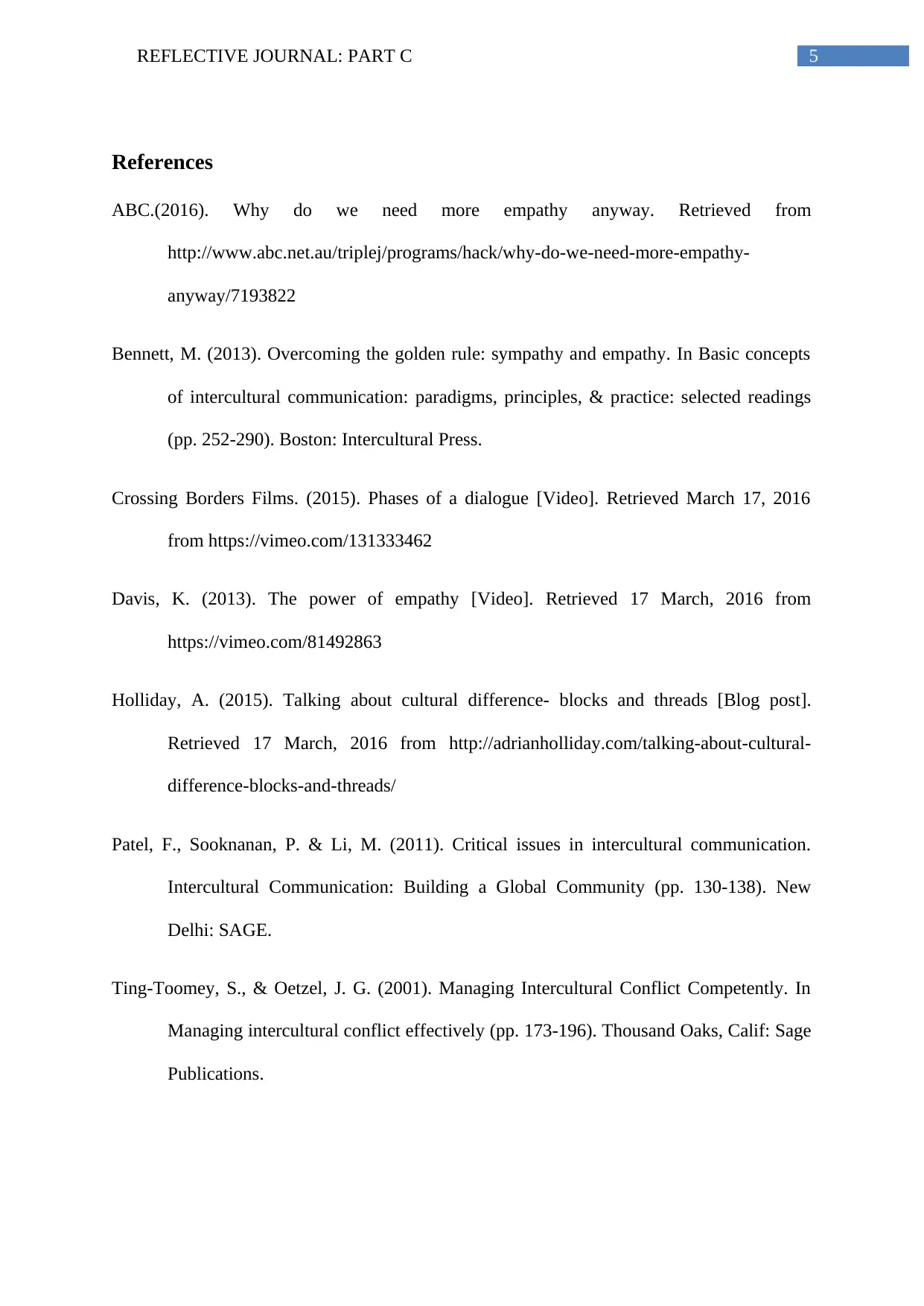
5REFLECTIVE JOURNAL: PART C
References
ABC.(2016). Why do we need more empathy anyway. Retrieved from
http://www.abc.net.au/triplej/programs/hack/why-do-we-need-more-empathy-
anyway/7193822
Bennett, M. (2013). Overcoming the golden rule: sympathy and empathy. In Basic concepts
of intercultural communication: paradigms, principles, & practice: selected readings
(pp. 252-290). Boston: Intercultural Press.
Crossing Borders Films. (2015). Phases of a dialogue [Video]. Retrieved March 17, 2016
from https://vimeo.com/131333462
Davis, K. (2013). The power of empathy [Video]. Retrieved 17 March, 2016 from
https://vimeo.com/81492863
Holliday, A. (2015). Talking about cultural difference- blocks and threads [Blog post].
Retrieved 17 March, 2016 from http://adrianholliday.com/talking-about-cultural-
difference-blocks-and-threads/
Patel, F., Sooknanan, P. & Li, M. (2011). Critical issues in intercultural communication.
Intercultural Communication: Building a Global Community (pp. 130-138). New
Delhi: SAGE.
Ting-Toomey, S., & Oetzel, J. G. (2001). Managing Intercultural Conflict Competently. In
Managing intercultural conflict effectively (pp. 173-196). Thousand Oaks, Calif: Sage
Publications.
References
ABC.(2016). Why do we need more empathy anyway. Retrieved from
http://www.abc.net.au/triplej/programs/hack/why-do-we-need-more-empathy-
anyway/7193822
Bennett, M. (2013). Overcoming the golden rule: sympathy and empathy. In Basic concepts
of intercultural communication: paradigms, principles, & practice: selected readings
(pp. 252-290). Boston: Intercultural Press.
Crossing Borders Films. (2015). Phases of a dialogue [Video]. Retrieved March 17, 2016
from https://vimeo.com/131333462
Davis, K. (2013). The power of empathy [Video]. Retrieved 17 March, 2016 from
https://vimeo.com/81492863
Holliday, A. (2015). Talking about cultural difference- blocks and threads [Blog post].
Retrieved 17 March, 2016 from http://adrianholliday.com/talking-about-cultural-
difference-blocks-and-threads/
Patel, F., Sooknanan, P. & Li, M. (2011). Critical issues in intercultural communication.
Intercultural Communication: Building a Global Community (pp. 130-138). New
Delhi: SAGE.
Ting-Toomey, S., & Oetzel, J. G. (2001). Managing Intercultural Conflict Competently. In
Managing intercultural conflict effectively (pp. 173-196). Thousand Oaks, Calif: Sage
Publications.
⊘ This is a preview!⊘
Do you want full access?
Subscribe today to unlock all pages.

Trusted by 1+ million students worldwide
1 out of 6
Related Documents
Your All-in-One AI-Powered Toolkit for Academic Success.
+13062052269
info@desklib.com
Available 24*7 on WhatsApp / Email
![[object Object]](/_next/static/media/star-bottom.7253800d.svg)
Unlock your academic potential
Copyright © 2020–2025 A2Z Services. All Rights Reserved. Developed and managed by ZUCOL.





